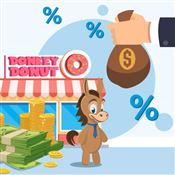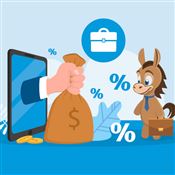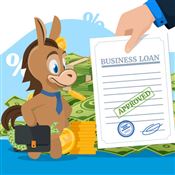Collateral for Business Loan
Business loans are typically backed by collateral. But lenders value collateral differently. Read on to learn about the types you can use.
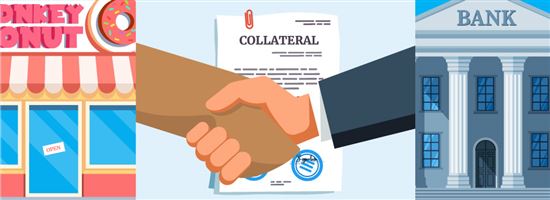 |
Collateral is typically a requirement for small business loans. But what happens when you don't have enough assets for them?
Is it possible to get a loan without collateral? What assets could be used as collateral?
Learn what you can use as collateral and how to get a loan without them.
Do You Need Collateral for a Business Loan?
Business loans are either secured or unsecured. Secured business loans require collateral while unsecured loans do not.
Collateral lessens the risk for lenders because these are assets you pledge as repayment for a loan. They will only be seized if your business defaults and you can't pay back the loan.
Collateral must be an asset you fully own. Lenders typically ask for it to amount to the same value as the loan. This is why they may require more than one asset to suffice.
Most Small Business Association (SBA) loans require collateral, but you won't necessarily get declined if the collateral is your only issue. If you don't have enough business assets, you may have to pledge personal assets.
Small Business Loans without Collateral
Unsecured business loans don't ask for collateral. But they typically require a personal guarantee.
A personal guarantee is an agreement that states you're personally responsible for loan repayment. If the business defaults, lenders get to seize your personal assets.
This lessens the risks for lenders in place of collateral.
Some loans are typically more accessible because there's tangible collateral (like equipment loans and auto loans). But creditworthiness is normally the main requirement for unsecured loans. This can make it a bit harder to qualify.
7 Types of Collateral for Business Loans
 |
The best collateral is an asset that can be liquidated quickly. Cash would be a good example.
However, the type of collateral also depends on the type of small business loan. Let's discuss this in more detail.
Real Estate Properties
Any personal or commercial property can be used as collateral. Lenders favor them because they retain value well over time.
If you opt for a real estate loan, the property you buy is the collateral. However, properties you already own can also be used for other long-term loans.
For example, if you use your property as collateral for an SBA 7(a) loan, you can use the loan amount for a variety of business needs. It can be for working capital, refinancing business debt, purchasing business supplies, and more.[1]
Equipment
You can use your business equipment as collateral for almost any type of business loan. This can include manufacturing, machinery, and other heavy equipment used in your business.
If you opt for an equipment loan, the equipment you purchase will serve as collateral.
However, the con of using equipment as collateral is the depreciation rate. If the equipment loses its value rapidly, then you might find it challenging to secure higher loan amounts.
Lenders typically list the type of equipment they fund. But they may also perform an appraisal of the equipment you're interested in.
Vehicles
Vehicles can be collateral, particularly for equipment and auto loans. You can use either personal or company vehicles if you or your business fully own them.
If you're still paying for the vehicle, you should have enough equity to use it as collateral. This means your total amount owed should be less than the car value.
Keep in mind cars tend to depreciate quickly. Some lenders may not accept vehicles over five to seven years old.
Regarding auto loans, the vehicle you purchase typically becomes the collateral.
Unpaid Invoices
Invoice financing is a small business loan where you can get a cash advance using your unpaid invoices. These unpaid invoices serve as collateral.
It works by lenders advancing up to 90% of the invoice amount. They pay the remaining 10% after all invoices are paid by your customers.
It's a great option for business-to-business (B2B) companies. Instead of waiting on your money, you can get a cash advance using outstanding invoices as collateral.
Invoice factoring is when you sell your company's unpaid invoices to a factoring company. The factoring company now owns the invoices and will have to collect the unpaid amounts themselves. This is unlike invoice financing, where the unpaid invoices are only collateral and you still have to collect payments from clients.
Inventory
Although it may not be as popular as the rest, your inventory can be used as collateral. It's typically used for inventory financing.
Inventory financing is a short-term loan you can use to purchase products for your small business. You can use either the existing or inventory you'll purchase as collateral.
Lenders will assess the value of the inventory and determine how much loan you'd be eligible for. You can use any type of inventory, such as clothing, gadgets, or office supplies.
It's great for product-based businesses, particularly manufacturers, wholesalers, and those in retail. However, it's risky as you could lose your products should your business default.
Cash or Savings
This may be the best collateral in terms of liquidity. It's suitable if you have extra cash in either your business or personal bank account.
A savings-secured loan uses cash as collateral. Your savings serve as security for the loan so you can only borrow the amount you already have.
This is a great option if you want to build your credit. Even if you already have the cash for a purchase, you can use it as collateral for a loan instead. Plus, you don't have to drain your savings.
By paying down a loan, you'll build credit. This helps you increase your options for small business loans down the road.
Other Investments
You can use stocks, bonds, and cryptocurrencies as collateral since they are liquid assets.
Crypto loans, for example, accept cryptocurrencies as collateral.
They increase your options if you can't qualify for a traditional business loan. Keep in mind the market can be volatile, so it's problematic if their values decline.
Collateral vs. Personal Guarantee vs. Blanket Lien
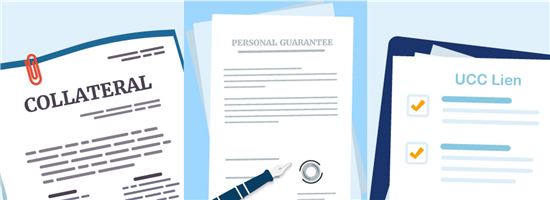 |
Collateral, personal guarantee, and blanket lien all involve your assets as a borrower. Lenders use them to back up the loan and lessen their risk for lending.
However, they have distinct differences.
- Collateral. Collateral pertains to assets you pledge as repayment for a loan if your business defaults. These assets are specified, and lenders will often perform appraisals to determine their value.
It's typically used for secured loans.
- Personal Guarantee. A personal guarantee is a legal promise you make to personally repay your business debt. You'll have to use personal assets or funds as you assume personal responsibility (like your home, car, or personal savings).
This is common for unsecured loans. But some lenders may still need a personal guarantee alongside collateral for secured loans.
- Blanket or UCC Lien. A blanket or Uniform Commercial Code lien allows the lenders to take you to court if your business defaults. They have the legal right to seize any or all of your business assets to regain their losses.
Although a lien can be specific to certain equipment, a blanket lien is a generalized lien where all your assets serve as collateral.
As you can see, most, if not all, business loans will need some form of collateral.
It's best to watch out for liens because they could pose a huge risk to you as a business owner. Lenders could seize multiple assets if it meets the value of the loan.
How Much Collateral is Needed for a Business Loan?
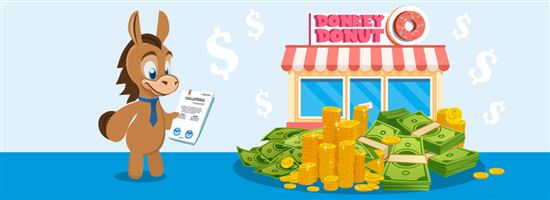 |
Generally, the value of your collateral should be equal to the value of your loan. For example, a $100,000 loan will need a $100,000 collateral.
How much your collateral is worth depends on the value of your assets. Some lenders will require your asset value to be higher than the loan amount. It lessens their risk in case the value depreciates.
After assessing your collateral, lenders use the loan-to-value (LTV) ratio to determine how much money to lend. However, this amount is still up to the lender.
Other factors, such as credit scores, capital, repayment, and loan conditions, are also considered.
How does the LTV ratio work?
LTV compares how much you want to borrow to the value of your asset.
Let's say you want to purchase a piece of equipment that's valued at $100,000 and use it as collateral for the loan. If the lender has a 75% LTV ratio, then you can only borrow $75,000. You will need to put down $25,000 as a down payment.
The higher the ratio, the higher the risk for lenders. Therefore, the loan will also have a higher interest rate. 80% LTV is generally a good ratio. Anything higher may incur higher borrowing costs.
| Type of Loan | Type of Collateral | Typical Loan-to-Value Ratio |
|---|---|---|
| SBA Loan | Depends on the lender; typically uses real estate and equipment as collateral | Up to 90% |
| Business Line of Credit | Accounts receivable or inventory (for secured lines of credit) | Up to 80% |
| Commercial Real Estate Loan | The property to be purchased or financed | 80% to 90% |
| Equipment Loan | The equipment to be purchased | 75% to 100% |
| Auto Loan | The vehicle to be purchased | 75% to 100% |
| Invoice Financing | Unpaid invoices | 90% to 100% |
| Inventory Financing | Inventory to be purchased or your current inventory | 80% to 100% |
| Savings Secured Loan | Cash or savings | Up to 100% |
Can You Get a Business Loan without Collateral?
It's unlikely that a lender will not ask for any form of collateral. As mentioned, unsecured loans still need personal guarantees. Other lenders require a blanket lien.
However, if you do not have the assets for collateral, you can still opt for asset-based loans.
Asset-based loans include commercial real estate loans, equipment loans, auto loans, and inventory financing. With these loans, you can use the items you'll purchase as collateral.
For this reason, they're often more accessible compared to other small business loans.
FAQs
What is collateral for a business?
Collateral are assets you pledge as repayment for a business loan if your business defaults. Lenders will seize these assets to recoup their losses. You can pledge business assets, but you might have to include personal assets if you don't have enough.
What collateral can be used for a business loan?
You can use any asset a lender deems valuable as collateral. This can be business properties, equipment, vehicles, unpaid invoices, inventory, and savings. Lenders typically perform appraisals to measure their value.
What collateral is required for SBA?
Given the loans SBA offers, you can use real estate, equipment, and inventory as collateral. Partner lenders may have other requirements. SBA 7(a) loans over $25,000 require a first lien on the assets you'll purchase and on all of your fixed assets.
Do all business loans require collateral?
Unsecured business loans don't require collateral. However, they may require a personal guarantee or blanket lien. You still need to have assets for these two. The difference is that assets are not specified and may include personal assets.
Bottom Line
Collateral is typically required when you apply for a small business loan. These are assets lenders can seize to recoup their losses if your business defaults.
Any asset can serve as collateral if the lender deems them valuable. The most common types are cash, real estate, vehicles, and equipment.
The higher the loan amount, the more collateral you'll need. If you don't have enough business assets, however, you'll likely have to use your personal assets.
Business loans that don't require collateral are called unsecured business loans. But lenders will still ask for a personal guarantee or blanket lien.
References
- ^ U.S. Small Business Administration. How do I use the 7(a) loan?, Retrieved 9/27/22
Write to Karen Eloriaga at feedback@creditdonkey.com. Follow us on Twitter and Facebook for our latest posts.
|
|
|
